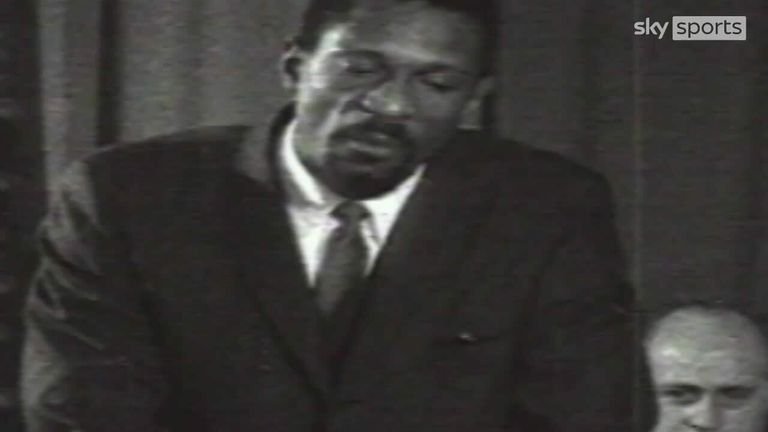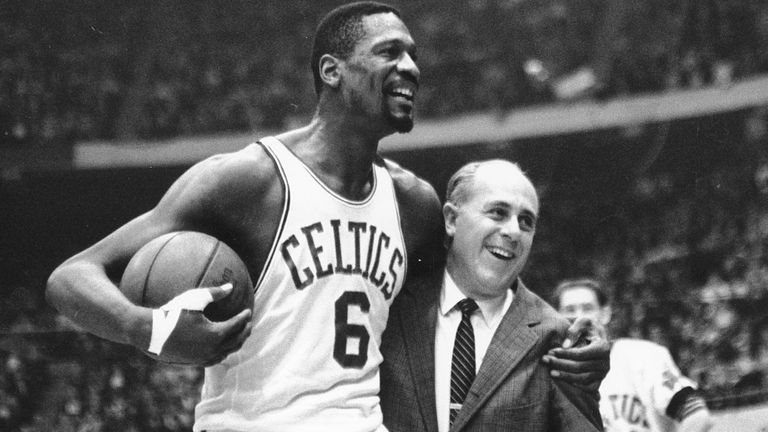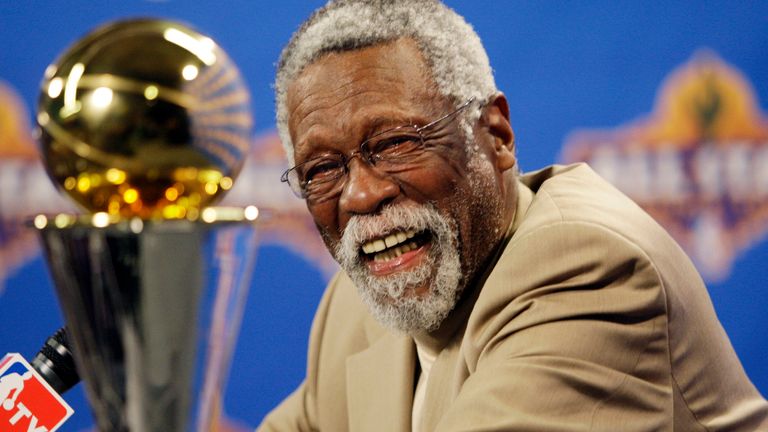BJ Armstrong: Without Bill Russell, there's no Michael Jordan, Kobe Bryant or LeBron James; it's why Black History Month is vital
In his second exclusive weekly column for Sky Sports, three-time NBA champion BJ Armstrong explains why understanding the struggles of those who fought to break racial barriers is absolutely vital; Black History Month runs in the USA until February 28 and is championed throughout the NBA
Friday 12 August 2022 01:36, UK
In every walk of life, the stories of the people that have gone before us provide context to what is happening here and now.
That is what Black History Month is all about and why it's important we celebrate it. In basketball, there is no Michael Jordan or LeBron James or Kobe Bryant without Bill Russell.
But understanding why Black History Month is important extends well beyond the bounds of basketball. As a black kid growing up in the city of Detroit, that is something that I got to learn acutely as anyone. I was very much aware of black history. My grandparents and my parents all came there from the south, and there is the obvious and terrible history of what happened in the south, so that was passed on to me early.
As a young guy, I can remember sitting around just listening to the adults talk about what was going on at that time in the 60s and the 70s so it was kind of ingrained in us to make sure that we were aware of our surroundings. You're just sitting there listening and you're absorbing all of this. Whether it was Martin Luther King or it was Malcolm X, those stories were passed on so I knew about what black people and particular people of colour were doing, the things they were fighting for at that particular time.
I am blessed that I was lucky enough to have a career that afforded me some amazing opportunities but it would never have happened if it wasn't for my upbringing, within my family, my community and the city of Detroit.
Early exposure to black leaders was vital
An important factor in that is that I was exposed to black leadership early. I owe an incredible amount to the city of Detroit and those people. The mayor was black; the chief of police was black; I had black teachers; I knew black business owners, black policemen; all of my coaches from my youth were people of colour. So that just seemed normal to me.
But I was also very aware that my grandmother and that generation didn't have an opportunity to finish school and do all of those things. So, the biggest thing for our family was for me, this little kid from Detroit, I was the first one of us to graduate college. That was the biggest achievement for our family.
I can vividly remember my grandmother, who's no longer with us, she always said, 'You know, the first rule of any job is to show up' and I took that to heart. I never missed one day of high school in four years.
My grandmother said that, every day, she had to show up and put food on the table for her family, whether she was sick, one of the kids were sick, grandkids were sick, she had to do it every single day. So, I thought, at the very least, I could just show up – and then from there, if I apply myself, who knows what I could do?
I learned those lessons and that's how I approach it even to this day, I'm going to show up. I always thought during my professional career: I'm going to show up – I may not shoot the ball, well, may not play well – but I'm going to show up and give you my best.
That lesson from my grandmother was one of the things that had the greatest impact on me growing up. Another really fond memory I have is from when I went to college, how great it was to be able to walk to class, to a lecture, with my grandmother.
She didn't have the opportunity to finish her education and was unable to read although she always encouraged us to read books. She grew up in the south in segregation, she didn't ever have an opportunity to sit with hundreds of white people. For her to sit there, I'll never forget, we just sat there and she thought it was the greatest.
That summed a lot up, in life, for me. The struggles and these stories are real. They may not all be in the history books, but they are all part of the story.
What it's like experiencing racism yourself
I had incidents of my own, of course, from about as young as 10 or 11 years old. Hearing things from the stands, slurs, name-calling or maybe a call in a game which wouldn't go your way and you had a good idea why. As a kid, you were like, 'Why are these racial slurs being called by people who don't look like me?'
I was aware that I was black, I was very aware of that, but until then I thought 'it only happened when you saw it on television' or in the past in the stories that my family had shared with me.
But then it happens to you. And then, all of a sudden, even at that age, I understood 'that's why we don't go on that side of the street, why we stay on our side'. Now, I had to deal with this, whether I was wanting to or not. I understood that this is what my uncles, parents, grandparents – who, especially, because of growing up in the south, they had stories on top of stories on top of stories – this is what they were talking about. Up until that point, I hadn't had any stories. And now I had a story.
Thinking back to that and of going to the college class with my grandmother, I suppose it created a sense of me giving myself me a responsibility to say, 'You never know who's looking at you or why, but you just keeping moving forward'.
As soon as I realised that, I felt the same sense of responsibility and stewardship that those people felt before me and all of my ancestors had. I felt a responsibility to be the best version of myself, because that moment showed me the possibilities. I remember how proud she was just to sit there and listen to that professor.
That is why it is important to make sure you show up, just as she advised. Your reward at the end is that sense of human achievement, when you achieve something because you worked for it. That achievement is investing into your future and the future of others, which is important in the context of Black History Month.
Diversity within the black community
I'm sure that these lessons helped drive me to achieve what I managed to achieve - but of course they're not just applicable to sport. Within the black community, there's a huge diversity, and within our community, we celebrate our diversity. There are tonnes of young African Americans who are doctors and lawyers and accountants and engineers - and some of us play sports, some of us have an opportunity to go coach athletics at a high level, whether that's high school or college or even at professional level.
The diversity within our culture is phenomenal. Travelling and moving around, you get a chance to see what these black women and black men are doing, whether they're taking care of their families, whether they're teachers or community leaders - whatever it may be, there are great things being done, barriers being broken that should be celebrated.
In sport, there is obviously more of a lens and so the black history there is often more well-known but that does not make it any more or less relevant. But as a lover of the game, I wholeheartedly recognise the importance of those who went before me and what they achieved.
We must remember and be thankful for barrier-breakers
When I begin to think about what Bill Russell and all of those players from that time had to endure, my respect for that era – especially given what they had to go through – is beyond reproach. To know that and hear some of those stories where they couldn't even stay in the same hotel, they couldn't even ride the same bus, where they had to drink from different water fountains, and all of the things that they had to go through, it's harrowing to think about.
When I've had an opportunity to speak to the likes of Mr Russell, or Kareem Abdul-Jabbar, or Walt Frazier, Oscar Robertson, and all those people and all those players that grew up in that era, I think back to the massive impact they had for black players and black people as a whole.
Then, when I see the game today, I'm so appreciative of them because without them there is none of this. And I know what that's like – me, a little kid from Detroit – I experienced that (playing in the NBA).
I can't help but think about what Bill Russell had to go through to win in a city like Boston and that's just one example of so, so many. It's hard to put into words how important all of those black pioneers were.
So, to watch Steph Curry, and to watch LeBron James, and when you see Michael Jordan, you have to see the Russells and the Roberstons, all those guys and what they achieved. Without them, this game would not be anywhere near where it is today - and that is why their contributions must always be remembered.
Live NBA basketball returns on Sky Sports this Thursday night with a tasty double-header: Brooklyn Nets travel to the Boston Celtics, live on Sky Sports Arena and Main Event from 12.30am, followed by Portland Trail Blazers facing Golden State Warriors from 3am.








